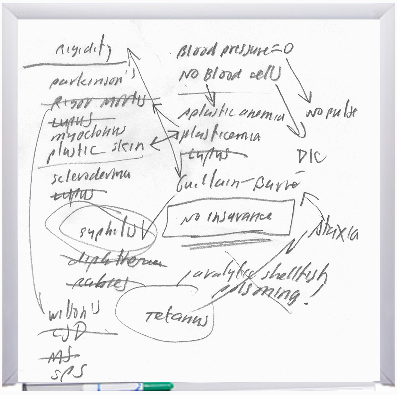Diagnosing Barbie
Barbie's Early Struggles and Medical Problems
 Whiteboard used to diagnose Barbie's symptoms
Whiteboard used to diagnose Barbie's symptoms
 arbie is universally regarded as one of the
most influential pharmaceutical industry executives of the 20th century.
Indeed, despite her humble roots in poverty-stricken rural Wisconsin,
Barbie was one of the most spectacularly successful executives of all
time, despite being just a girl and being made entirely of plastic.
arbie is universally regarded as one of the
most influential pharmaceutical industry executives of the 20th century.
Indeed, despite her humble roots in poverty-stricken rural Wisconsin,
Barbie was one of the most spectacularly successful executives of all
time, despite being just a girl and being made entirely of plastic.
Considering Barbie's humble beginnings, few would have predicted the influence she would wield in corporate America, or that she would come within a hair's breadth of becoming President of the United States. Her early years were a continuing struggle against poverty. “Will we ever have enough clothes?” she often asked despairingly. At one point, shortly after moving to New Jersey, things were so bad that Barbie was nearly forced to sell her pink Corvette.
Barbie was also physically abused as a child. This has been attributed to the fact that she was born as a fully-developed adult female, and therefore attracted unwanted attention from little boys who frequently scraped her naked plastic body against the concrete, dismantled her accessories, and ripped off her plastic head and limbs. With the aid of a skilled plastic surgeon, Barbie managed to survive these injuries; but these early traumas were to have a lasting impact on her outlook on life. It is undoubtedly these violent early experiences along with the grinding poverty of life in Glen Rock, N. J. that caused Barbie to adopt a practical and even sometimes cravenly materialistic philosophy of life.
In addition to numerous scrapes, bruises and dismembered limbs, Barbie also suffered from gigantomastia, a rare disorder in which the mammary glands are disproportionately enlarged. Her case was remarkable in having been the only known case of gigantomastia to be present from birth. However, Barbie had several other puzzling symptoms which made diagnosis difficult. She also exhibited muscle rigidity and a complete lack of blood cells. Her blood pressure was measured at zero over zero. After consultations with a crack New Jersey diagnostician, who initially misdiagnosed her condition as scleroderma, lupus, leukemia, malaria, amyloidosis, syphilis, Tay Sachs disease, ebola, Parkinson's disease, aplastic anemia, linitis plastica, plasticemia and plastic bronchitis, it was finally recognized that her true condition was precocious puberty. Unfortunately, the diagnosis came too late: the medical resident tasked with stopping her ongoing procedure was stopped by his angry girlfriend on the way to Radiation. By the time he reached Barbie, she had already been subjected to a massive dose of full-body radiation. Barbie's immune system was completely destroyed and she became infertile. As a result, Barbie was never able to have children.
Barbie obtained her Ph.D. in 1986, specializing in pharmacokinetics with a minor in shopping. This latter specialization, in reality more of a hobby, served Barbie well: she later went on to receive honorary MBA degrees from Northwestern, Harvard, and Fisher-Price based on her groundbreaking economic theories emphasizing the importance of stimulating consumer demand by shopping for clothes.
Executive Career
 Barbie's character, pronounced “The plastic toy formerly known as Barbie”
Barbie's character, pronounced “The plastic toy formerly known as Barbie”
 Barbie shown with fashion accessories including dog, pooper scooper,
cleaning supplies, and dog manure
Barbie shown with fashion accessories including dog, pooper scooper,
cleaning supplies, and dog manure
Despite her intelligence and sharp verbal skills, Barbie's difficulty with mathematics was legendary, particularly when it came to multidimensional Runge-Kutta differential equations, which she often described as "tough." Her struggle to comprehend the advanced mathematics required for performing research in the pharmacokinetics of neuroendocrine antagonists, which engaged her postdoctoral efforts, earned Barbie praise from feminists across the globe, who acclaimed her defiant attempts to overcome the natural weakness in math shared by all women. This weakness, according to the feminists, was caused by their smaller brain capacity and the disruptive influence of estrogen, which made them unable to compete fairly against men; to make life fair would require mandatory affirmative action programs, massive amounts of funding for feminist study programs, and free pink Corvettes for everyone. In other words, because they are just girls, they need special privileges. Barbie, being just a girl herself, possessed both of these crippling female qualities--small brain capacity and high estrogen levels--in abundance. But these handicaps only spurred her to greater achievements.
The apex of Barbie's career was reached when she became vice-president of Global Research and Development at a huge pharma company in 1994. Shortly thereafter, the company went on a buying spree. Barbie was instrumentally responsible for the company's acquisition of several smaller companies including Merck, Monsanto, and Macy's. Barbie's management style, criticized by some as exhibiting a “let's go shopping” mentality, led to a massive expansion of their global conglomerate portfolio. However, in the eyes of stockholders, it also exposed the company to excessive financial risk, and Barbie was forced to resign in 1996. Barbie took this setback hard. The day after being fired, she slipped on her camo and two nine-millimeter bandoliers borrowed from her friend, G.I. Joe, with whom she had once had a torrid love affair. “Want to go shopping?” she asked, racking the slider of her color-coordinated pink Glock 17. “Okay, meet me at the mall.” Luckily, Barbie changed her mind and decided not to commit mass murder, but had a pizza party instead.
In 2003, Barbie tried to change her name to ༃ (see larger symbol at left). Unexpectedly, her request for a legal name change was denied by a special session of the Groton, Connecticut city council. It was the beginning of the end. Later that year, Barbie appeared on an MSNBC program called Hairball with Chris Matthews where she hoped to discuss her presidential aspirations and promote her latest book, Ken Is, Like, So Whipped. It was here that Barbie finally snapped. Standing on a chair, she looked unblinkingly into the camera and in a gravelly, almost masculine-sounding voice she uttered those three words that destroyed her career: "Eat lead, Cobra!!!"
There has been much speculation on the meaning of those words and why Barbie chose to speak them. Several scholars pointed out that Cobra was the name of a terrorist group that had threatened Barbie's lover, G.I. Joe. Others claimed that "Cobra" was actually Barbie's code word for Jacqueline Urla, a feminist writer whom Barbie had grown to hate because of her heartless criticism of Barbie's physical attributes. Some suggested that it was a symptom of Barbie's lifelong struggle with Tourette's. A few even claimed that Barbie had been the victim of a twisted prank played by an anarchist group known as the Barbie Liberation Organization (BLO) who had replaced her sound chip with one from G. I. Joe. Regardless of which theory was true, one thing was clear: Barbie's future in politics was over.
Presidential Ambitions
After the Hairball incident, Barbie's political career nose-dived. The Draft Barbie movement in 2004 came to an abrupt halt when Barbie said, in a speech that is still quoted with teary-eyed admiration to this day, “If nominated, I will not accept. If drafted, I will not run. If elected, I will not serve. If forced to serve, I will do a bad job. If forced to do a good job, I will just raise taxes and spend, spend, spend. I love shopping!” Economists praised this remark as the purest expression of the philosophy of Keynesianism, which emphasizes the importance of government spending. Although Barbie now lives in obscurity, her legacy lives on: "I love shopping!" has become the permanent official platform of the Democratic party.
